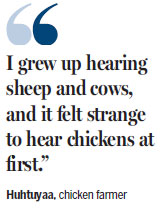Poultry an ally against invading desert

Ongoing efforts to reverse desertification have put more food on tables and more money into farmers' pockets - but for some it has taken time to get used to.
Every morning, Huhtuyaa wakes up to the sound of crowing roosters, his complimentary, battery-free wake-up service signaling the start of another busy day on the farm.
Yet he was not so comfortable with the din 13 years ago when his family abandoned grazing and began raising chickens for a living.
"I grew up hearing sheep and cows, and it felt strange to hear chickens at first," said Huhtuyaa, who lives in Sainhoda township, deep in the Hunshandake area of the Inner Mongolia autonomous region. In early summer, Hunshandake turns green. But two decades ago, 80 percent of the area was sand dunes. The arid region was believed to be a major source of the severe sandstorms that would often shroud northern China.
In 2002, China launched a sand control project in the Beijing-Tianjin-Hebei area. A series of environmental restoration efforts were undertaken in Hunshandake, with one of them being encouraging pastoral herders to raise chickens instead.
Scientists at the Hunshandake environmental research station at the Chinese Academy of Sciences brought chickens to the desert, and persuaded some herders to give up grazing. However, most were reluctant to change their traditional way of living.
Huhtuyaa's family decided to take a chance. With low interest loans offered by the government, his parents bought about 400 chicks in 2005. Afraid that there might be no market for their birds, they often traveled to Hebei province and Beijing looking for potential customers.
Huhtuyaa joined his parents in raising chickens after graduating from high school in 2007. Over the years, the family's land grew ever greener. The grass seeds and worms became delicacies for chickens, and the birds' waste fertilized the expanding grassland. A natural cycle of renewal was established.
In the past, cows, sheep and goats would devour grasses down to the roots, leaving topsoil to be blown away and lost to desertification.
Now, Huhtuyaa takes a leisurely daily walk on the grassland before starting his work. His income has also risen thanks to the growing demand for chickens. Two years ago, the family invested over 6 million yuan ($940,900) and opened an eco-tourism business. Every year, they sell about 8,000 chickens and 290,000 eggs, making them as much as 1 million yuan.
The farm has also become a tourist attraction. Visitors can enjoy the grassland scenery as well as freshly cooked chicken and eggs.
Huhtuyaa's success has attracted the attention of many of his neighbors. He plans to give 30 to 50 chicks to them and buy the birds back when they are fully grown.
Xinhua
(China Daily 06/06/2018 page7)
MOST POPULAR
- 1 China to give visa-free treatment to another 9 countries
- 2 China fully opens manufacturing sector to foreign investors in landmark opening up move
- 3 China's import expo attracts record-breaking participating countries, exhibitors
- 4 China's door opening even wider to foreign visitors, businesses
- 5 China revises rules to ease foreign strategic investment in listed firms
Editors' Picks
 Infographic:
China's public holidays for 2025
Infographic:
China's public holidays for 2025
 Infographic:
Basic facts of APEC
Infographic:
Basic facts of APEC
 Infographic:
Wrapping up the 7th CIIE: Data recap
Infographic:
Wrapping up the 7th CIIE: Data recap




